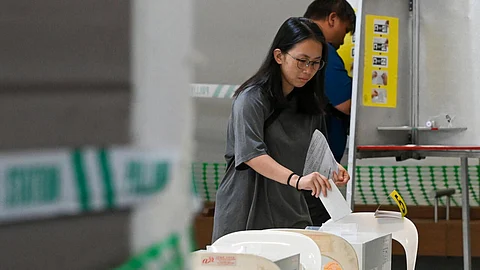
- NEWS
- the EDIT
- COMMENTARY
- BUSINESS
- LIFE
- SHOW
- ACTION
- GLOBAL GOALS
- SNAPS
- DYARYO TIRADA
- MORE

SINGAPORE (AFP) — Singaporeans cast their votes Saturday in an election where Prime Minister Lawrence Wong faces his first major test against a rejuvenated opposition in uncertain economic times for the trade-centered nation.
Wong’s ruling People’s Action Party (PAP), which has steered the island to prosperity while using an iron hand to suppress dissent, is expected to easily retain a clear majority in parliament.
Wong, wearing all white — the PAP’s color — arrived at a voting center around noon, accompanied by his wife.
After casting his ballot, he left without speaking to reporters.
Popular after leading Singapore’s Covid task force, Wong took over last year from his predecessor Lee Hsien Loong, the son of founding premier Lee Kuan Yew who ruled the island state after its bitter break-up with Malaysia in 1965.
Wong has repeatedly said he needed a strong mandate to navigate heavily trade-reliant Singapore through economic uncertainty in light of tariffs levied by United States President Donald Trump.
He has warned Singapore would be hit hard if Trump went ahead with the tariffs he announced and then paused for most countries, except China, and needed to stay open and competitive to counter their effects.
“So I say to all Singaporeans, please consider carefully. This is not a gamble. This is your family, your future, our Singapore,” he said during the campaign.
Political analyst Nydia Ngiow said the PAP had long been seen as Singapore’s steady hand in crises but that the recent tariff turmoil may not be a big factor for voters yet.
“Given that general elections in Singapore tend to focus on local issues, it is unlikely that geopolitics will shape voters’ decisions — unless Singaporeans feel a direct and tangible impact on their cost of living, job security or the broader economy,” she told Agence France-Presse (AFP).
Muhammad Nazri bin Hadri, a 25-year-old voter, said he was finding it “very difficult” to buy a house.
“I hope there are some changes to (public housing) rules,” he told AFP after casting his ballot.
The overwhelming PAP majority in Singapore’s unicameral legislature is such a norm in the wealthy island’s political landscape that the opposition and its supporters will consider a few more seats gained as a significant victory, observers said.
But the PAP’s dominance is increasingly being challenged by a more vocal electorate, especially among younger voters who appear open to alternative political voices.
“Young voters will be a factor in some wards. Unlike the older voters they are prepared to listen to both sides and make an informed decision,” said veteran former news editor and political observer P.N. Balji.
One voter told AFP she had been impressed by “refreshing and exciting” new candidates from across the political spectrum.
“Whether or not they get elected, I hope we see and hear more of them, and get to know them better,” said 40-year-old Shi’ai Liang.
